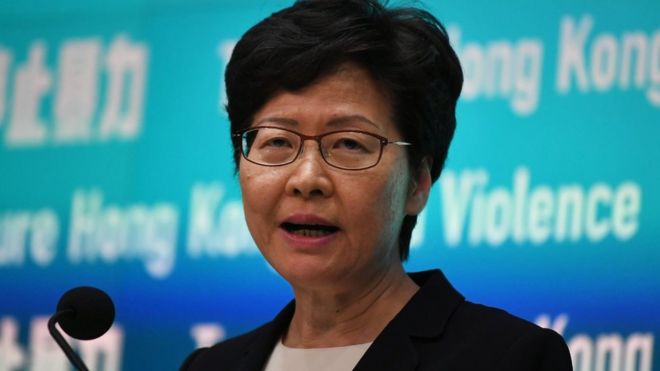Hong Kong's CEO Carrie Lam has utilized a pilgrim time crisis law to boycott face veils following quite a while of furious challenges.

The measure was reported on Friday, after the city saw across the board brutality on 1 October, the 70th commemoration of Communist Party rule in China.
Ms Lam said the brutality was "decimating the city" and specialists proved unable "simply leave the circumstance to deteriorate and more terrible."
The boycott becomes effective on Saturday.
The enactment conjured by Ms Lam, called the Emergency Regulations Ordinance, dates to 1922 and has not been utilized since there were revolts in Hong Kong in 1967.

Hong Kong's challenges began in June, started by proposition to remove presumed hoodlums to territory China.
The removal bill has since been dropped yet dissents have augmented into expansive expert majority rules system showings.
Throughout the months, conflicts among police and activists have turned out to be progressively brutal. On Tuesday, police shot a dissenter with a live projectile just because.
Specialists said the 18-year-old, who was captured in the wake of being shot, was in a steady condition in emergency clinic.
Where does the boycott apply?
Secretary for Security John Lee said the boycott would apply for endorsed and unapproved open gatherings - rallies and walks - just as in unlawful congregations and uproars.
There are exclusions for individuals wearing covers for wellbeing reasons, or whenever required by their calling.
Ms Lam focused on the new guideline didn't imply that Hong Kong was in a highly sensitive situation. However, she said the city was "in a condition of genuine open threat".
Hong Kong is a previous British state given back to China in 1997.
It has a "one nation, two frameworks" understanding that promises it some self-sufficiency, and its kin certain opportunities.

The measure was reported on Friday, after the city saw across the board brutality on 1 October, the 70th commemoration of Communist Party rule in China.
Ms Lam said the brutality was "decimating the city" and specialists proved unable "simply leave the circumstance to deteriorate and more terrible."
The boycott becomes effective on Saturday.
The enactment conjured by Ms Lam, called the Emergency Regulations Ordinance, dates to 1922 and has not been utilized since there were revolts in Hong Kong in 1967.

Hong Kong's challenges began in June, started by proposition to remove presumed hoodlums to territory China.
The removal bill has since been dropped yet dissents have augmented into expansive expert majority rules system showings.
Throughout the months, conflicts among police and activists have turned out to be progressively brutal. On Tuesday, police shot a dissenter with a live projectile just because.
Specialists said the 18-year-old, who was captured in the wake of being shot, was in a steady condition in emergency clinic.
Where does the boycott apply?
Secretary for Security John Lee said the boycott would apply for endorsed and unapproved open gatherings - rallies and walks - just as in unlawful congregations and uproars.
There are exclusions for individuals wearing covers for wellbeing reasons, or whenever required by their calling.
Ms Lam focused on the new guideline didn't imply that Hong Kong was in a highly sensitive situation. However, she said the city was "in a condition of genuine open threat".
Hong Kong is a previous British state given back to China in 1997.
It has a "one nation, two frameworks" understanding that promises it some self-sufficiency, and its kin certain opportunities.


0 Comments